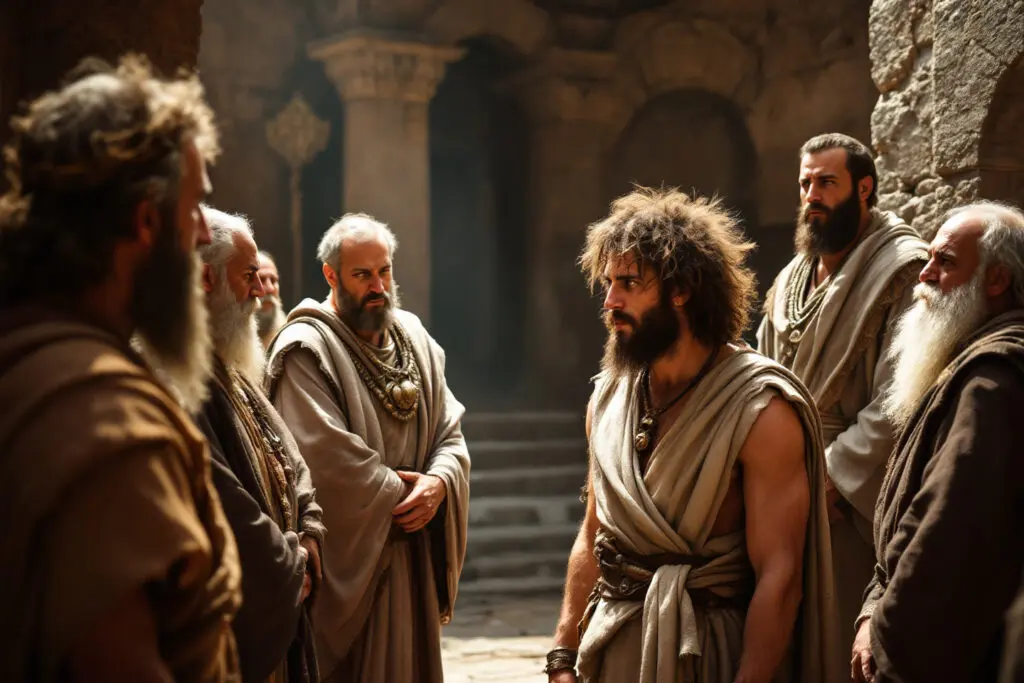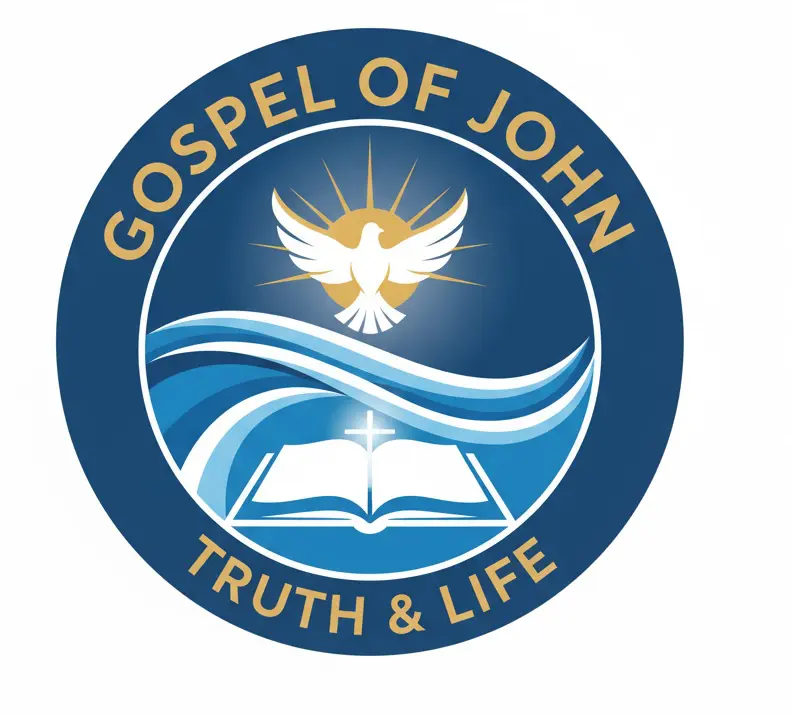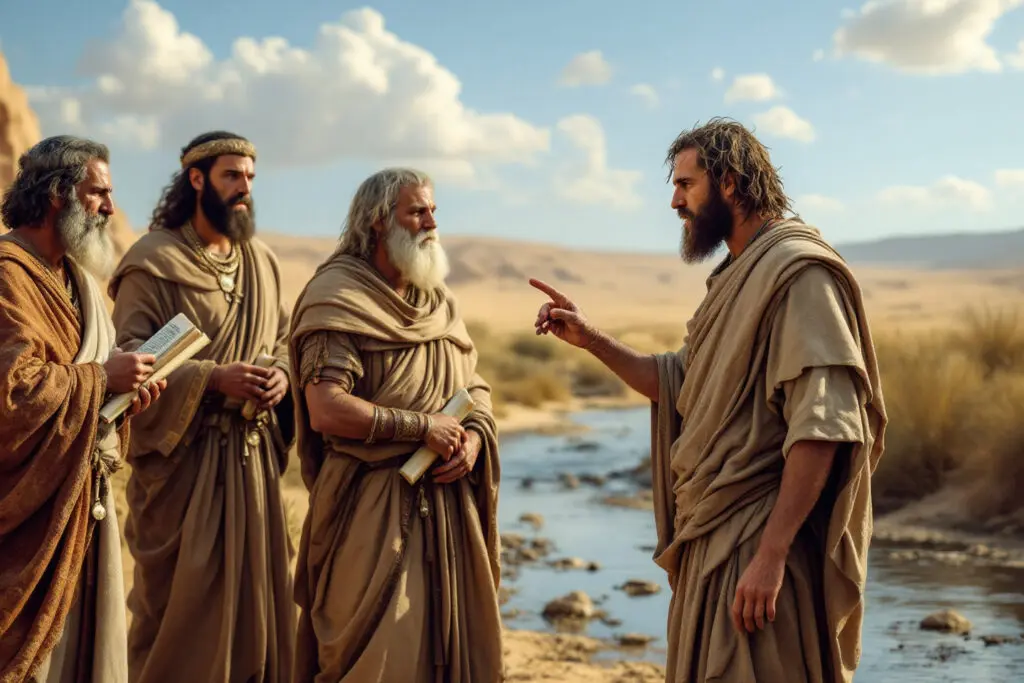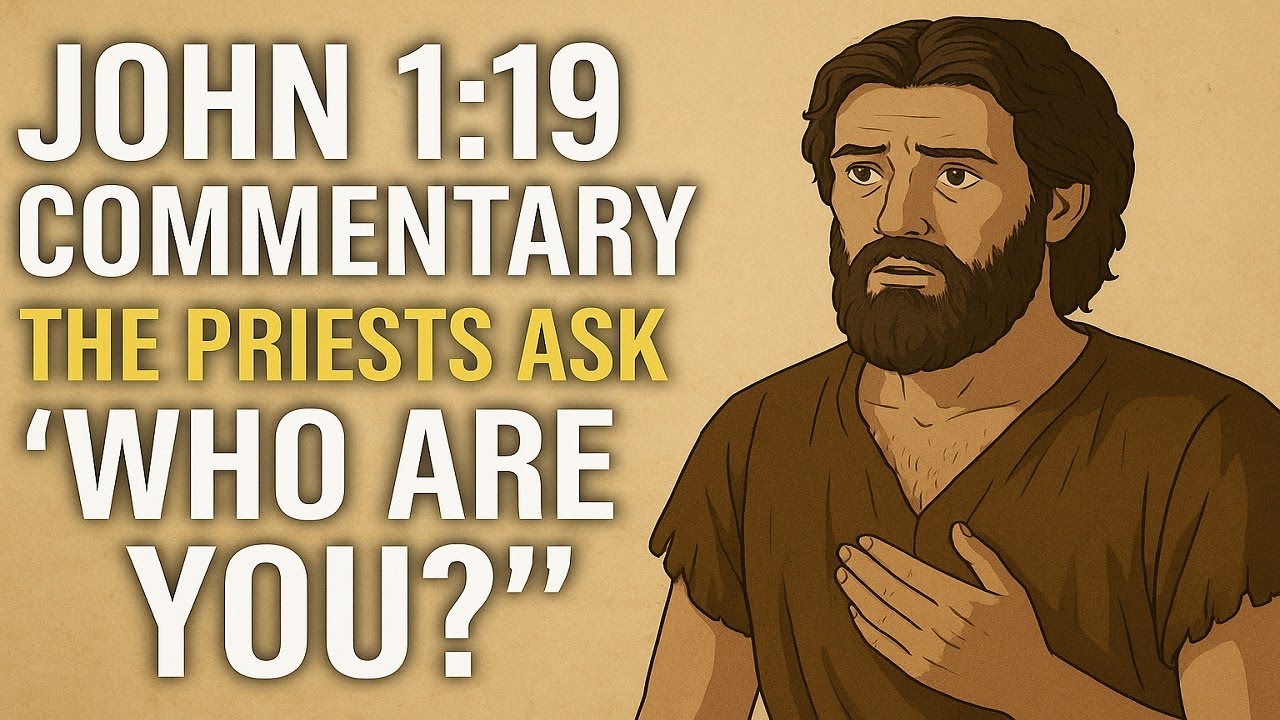Table of Contents
- Key Takeaways
- Why Did Jerusalem’s Elite Suddenly Care So Much About a Man in the Desert?
- What Was Really Behind Their Question, “Who Are You?”
- Why Did John So Forcefully Deny Being the “Big Three”?
- After All the Denials, Who Does John Finally Say He Is?
- How Does This Ancient Encounter Speak to Us Today?
- FAQ – John 1:19 Commentary
The question just hangs there. “Who are you?” It’s the most basic question we ever face. We get it in job interviews, on awkward first dates, and from that one aunt we only see at holidays. We even ask it of ourselves in the dead of night when sleep won’t come.
It’s a question about who we are, what we’re doing here. And in the sun-scorched wilderness of Judea, a group of powerful men traveled all the way from Jerusalem to ask this very thing of a wild man who ate locusts for lunch. That confrontation, captured in the Gospel of John, was a turning point. This detailed John 1:19 commentary is all about that encounter—the weight of their question, and the world-changing power of John the Baptist’s answer.
More in John Chapter 1 Category
Key Takeaways
- John 1:19 kicks off the first official testimony from John the Baptist, triggered by an investigation from Jerusalem’s religious leaders.
- The delegation wasn’t just anybody; priests and Levites sent by the Sanhedrin meant they saw John’s movement as a serious threat that needed to be checked out.
- John defines himself by who he isn’t first. He makes it clear he’s not the Christ, not Elijah, and not the Prophet before he says who he is.
- His final answer, “I am the voice of one crying in the wilderness,” is a masterclass in humility. He positions himself as the opening act, not the main event, for King Jesus.
- The passage is a challenge for us. It pushes us to find our identity not in job titles or self-promotion, but in our role as people who point others to Jesus.
Why Did Jerusalem’s Elite Suddenly Care So Much About a Man in the Desert?
You have to picture it. The buzz was spreading faster than a desert fire. Whispers in the market. Gossip on the temple steps. There was a guy out by the Jordan River, and his message of repentance was raw and real. This wasn’t some polished city preacher. This was John. Dressed in camel’s hair, fire in his eyes, and pulling in massive crowds from everywhere.
The religious establishment couldn’t ignore this. Not a chance. They were the gatekeepers of Israel’s spiritual life. The whole system—the temple, the priests, the Law—was under their control. Then this outsider shows up, doing his own thing: a baptism for forgiving sins. It was a direct challenge to their authority. People were getting right with God in the muddy river, not in the marble temple.
So, they sent a team. And not just any team. “Priests and Levites.” This was an official delegation, the A-team from Jerusalem, sent to get answers. Their presence alone signaled how serious this was. This wasn’t a friendly chat. It was an investigation.
What Was Really Behind Their Question, “Who Are You?”
This wasn’t small talk. When they asked, “Who are you?” they weren’t asking for his name. They knew that. This was a formal demand, loaded with legal implications. They were really asking, “By what authority are you doing this? Where are your credentials? Who gave you permission to disrupt our traditions and stir up the crowds?”
It was an interrogation.
I remember when I first started writing and speaking about my faith. A well-meaning but skeptical older man from my church pulled me aside. He peered over his glasses. “Now, son,” he said, “who are you to be telling people all this?” He wasn’t asking for my name. He wanted to know about my seminary degree, my ordination, my official stamp of approval. It felt less like a question and more like a challenge. That’s the vibe coming from these priests and Levites. They came looking for a resume, but John was about to start a revolution.
Why Did John So Forcefully Deny Being the “Big Three”?
The delegation came with a mental checklist of possible identities for this new prophet. They were trying to cram him into a neat box from their prophecies. John’s response is a brilliant lesson in humility. He knew they were focused on the wrong thing—the messenger, not the Message that was coming.
First, Why Did They Even Think He Might Be the Christ?
Israel was suffering under Roman rule. The people were desperate for the Messiah—the Christ, the Anointed One. They yearned for a hero to restore their nation’s glory. John’s fiery preaching and his rugged, holy lifestyle made him look the part. He was magnetic. He was powerful. Could he be the one?
The text is emphatic: “He confessed, and did not deny, but confessed…” The writer drills it home. John slams the door shut on that idea immediately. His first job was making one thing absolutely clear: “I am not Him.”
It’s a huge lesson. Before you can say who you are, sometimes you have to be clear about who you are not. He was tearing down any pedestal they tried to put him on.
If Not the Messiah, Then Why Did They Suggest Elijah?
This guess came straight from the last page of the Old Testament. Malachi 4:5 promised, “Behold, I will send you Elijah the prophet before the great and awesome day of the LORD comes.” Elijah’s return was supposed to be the final sign, the immediate warm-up act for the Messiah.
John certainly looked the part. A wilderness prophet, speaking truth to power, just like Elijah. It was a good guess. Still, John’s answer was a blunt, “I am not.”
This is fascinating because Jesus himself later says that John had the “spirit and power of Elijah” (Luke 1:17) and even that he “is the Elijah who was to come” (Matthew 11:14). So why the denial? In his deep humility, John refuses the title. He isn’t a reincarnated Elijah. He is fulfilling that role, but he won’t take the credit. No label, no matter how great, would distract from his real purpose: pointing to someone else.
Finally, Who Was “the Prophet” They Were Asking About?
This last question points back to Deuteronomy 18:15, where Moses promised, “The LORD your God will raise up for you a prophet like me.” While this is ultimately about Jesus, many first-century Jews expected another great figure, “the Prophet,” to show up alongside the Messiah and Elijah—a kind of new Moses.
Again, John shuts it down. “Are you the Prophet?”
“No.”
Three questions. Three denials. He systematically took apart every box they tried to put him in. He refused every crown they offered.
After All the Denials, Who Does John Finally Say He Is?
Totally exasperated, the delegation demands a real answer. “What then do you say about yourself?” They had to bring something back to the men who sent them. John’s reply, in verse 23, is one of the most powerful declarations of identity in the entire Bible.
He doesn’t give them a title or a position. He gives them a quote from the prophet Isaiah.
“I am the voice of one crying in the wilderness, ‘Make straight the way of the Lord.’”
Just let that sink in.
What Does It Mean to Be Just a “Voice”?
Think about the humility here. He doesn’t even say he’s the man crying out. He’s just the voice. A voice isn’t a person; it’s a vehicle for a message. A voice delivers the words and then it’s gone. John was saying, “I am not the main event. I’m the announcement for it. My whole life is a soundwave carrying the news that the King is coming.”
In our world of personal brands and influencer platforms, this is a radical way to see yourself. We’re all told to build our name, grow our following, be the star. John’s life is a protest against all that. He actively made himself smaller so Christ could look bigger. As he says later, “He must increase, but I must decrease” (John 3:30).
What’s This About a “Wilderness” and “Making the Way Straight”?
The quote from Isaiah 40:3 would have hit home for his audience. It’s all about exile and return, a new beginning. The wilderness is where God tests and purifies His people. John was tapping into that deep history, calling people out of their corrupt but comfortable lives and into a place of repentance to meet God.
“Make straight the way” was a real-world job. When a king was about to visit, a herald went ahead of the royal party. His job was to order the people to prepare the road. They had to:
- Fill in the potholes.
- Level the hills.
- Clear away the rocks.
It was literal roadwork for a royal visit. John is saying his work is spiritual roadwork. He’s the herald calling people to get their hearts ready for King Jesus. The potholes of sin, the mountains of pride, the crooked paths of injustice—he was telling them to get it all straight. His baptism was the shovel, his message the call to get to work.
How Does This Ancient Encounter Speak to Us Today?
This John 1:19 commentary isn’t just a dusty history lesson. It’s a mirror. The question “Who are you?” gets thrown at us all the time, and we’re expected to answer with our job title, our relationship status, our social media bio. We feel the pressure to build a brand, to prove we matter.
I see it everywhere. Young people trying to curate an identity that gets likes. Professionals wondering if their career is all they are. We all feel that pull to be somebody important.
John shows us another way. He shows that a real identity isn’t found in who we are, but in Whose we are. His importance came from his connection to Jesus Christ. He knew his role and played it faithfully. As scholars at institutions like Dallas Theological Seminary have noted, John’s testimony is a cornerstone of the gospel.
We can learn so much from him.
- Humility is Strength: Real greatness isn’t making a name for ourselves; it’s making His name known. Our best purpose is to be a signpost pointing to Jesus.
- Clarity is Crucial: John knew exactly who he wasn’t. We also have to learn to reject the false labels the world puts on us. Our identity is secure in Christ, not in what’s popular.
- Purpose Over Position: Being a “voice” wasn’t a glamorous gig. It was temporary, hard, and it ultimately got him killed. But it was his God-given purpose, and he owned it. Living out our purpose is so much better than chasing a position.
The priests and Levites came looking for a man they could categorize and control. They left having heard a voice. A voice that announced a new beginning. A voice that prepared the way for God in the flesh.
The question still rings out today. “Who are you?”
John answered it perfectly. A voice. A witness. A road-builder for the King.
How will we answer?
FAQ – John 1:19 Commentary

What does John the Baptist mean by describing himself as “the voice of one crying in the wilderness”?
By describing himself as “the voice of one crying in the wilderness,” John emphasizes his role as a messenger announcing the coming of Jesus. It signifies humility and a recognition that he is merely a vessel for God’s message, calling people to prepare their hearts for the Lord, similar to a herald preparing the way for a king.
Why did John the Baptist deny being the Christ, Elijah, or the Prophet when questioned by the authorities?
John the Baptist denied being the Christ, Elijah, or the Prophet to make it clear that he was not the main figure, but rather the one preparing the way for Jesus Christ. His denials reflected humility and a focus on his true purpose to point others to God’s salvation rather than seek personal recognition or claim titles that could distract from the coming Messiah.
What is the significance of John the Baptist’s response to the question, “Who are you?” in John 1:19?
John’s response to the question “Who are you?” is highly significant because he denies being the Christ, Elijah, or the Prophet, and instead declares himself as “the voice of one crying in the wilderness”. This highlights his humility and his role in pointing others to Jesus, emphasizing that his purpose is to prepare the way for the Lord rather than to seek personal glory.






